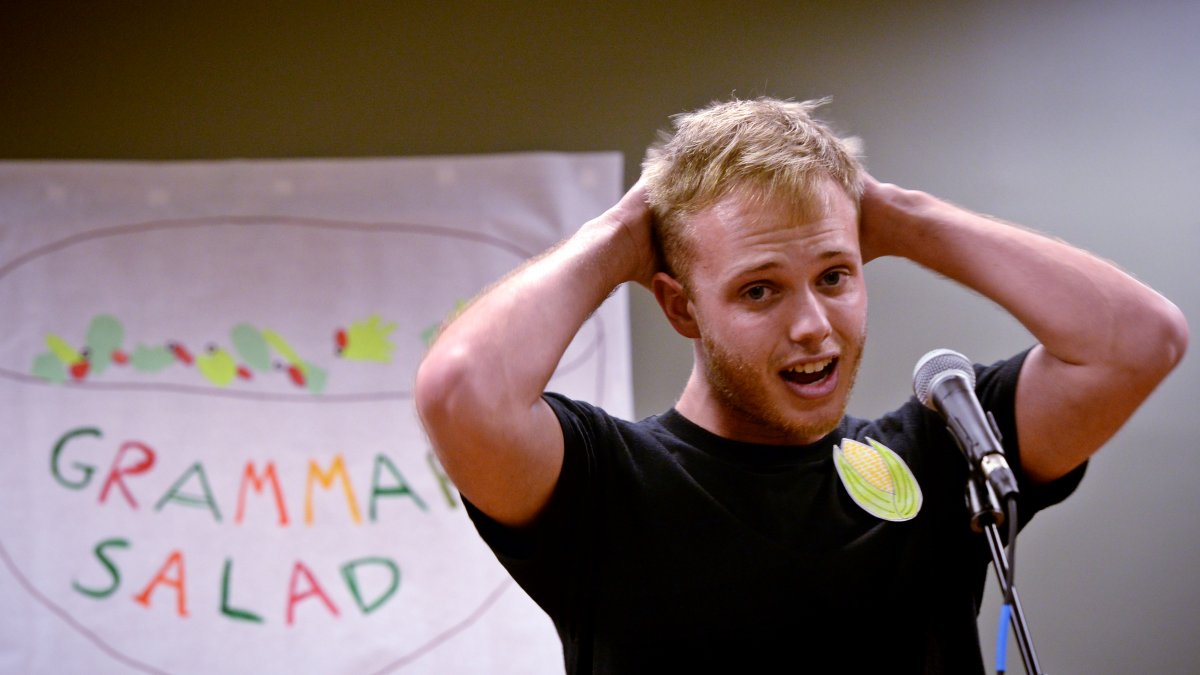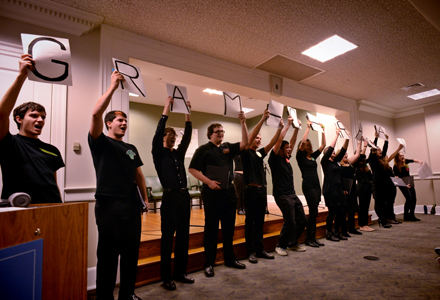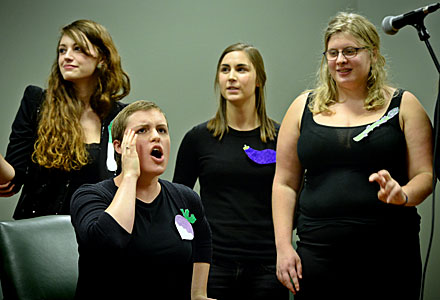Gram-o-Rama elicits laughs, cheers
The students in English 307 presented Gram-o-Rama, a series of acts and songs the students wrote that take a playful look at the rules of language.

For an hour Tuesday evening, 14 UNC-Chapel Hill students made more than 200 peers, faculty, parents and Chancellor Carol L. Folt laugh and cheer as they performed skits about an unlikely topic: grammar.

The cast opens the Gram-o-Rama performance at the University of North Carolina at Chapel Hill. Photo by Dan Sears.
The students in English 307 presented Gram-o-Rama, a series of acts and songs the students wrote that take a playful look at the rules of language.
For instance, in one skit about the tragic death of Bozo the Clown, student Heather Wilson spoke only in the passive voice.
“Bozo was met by me on the second day of clown school when a banana peel was slipped on by both of us. A lifelong friendship was then formed by us. Great sadness was had by all when violent dying was experienced by Bozo,” Wilson recited on stage.
In a skit that emphasized parts of speech, senior Carly Griffin discussed starting school at Grammar High and wondered which group of nouns she would become friends with and what clubs and activities she would join.
“Should I sign up for a team of verbs? They always seem to be popular because of their ability to run, dribble, pass, shoot, block, all for the glory of the school,” she said. “I don’t think I will be trying out for the interjection squad though. I cannot see myself standing around all day shouting yeah, yahoo … hip hip hooray. And I don’t want to be a preposition, always bossing nouns around and telling them how to do things: ‘Sit over there. Don’t talk to him or don’t go against the status quo.’ Prepositions don’t allow much free thinking.”
Gram-o-Rama is part of a creative writing course started in the 1970s by now-retired professor Daphne Athas. Marianne Gingher,a professor in the College of Arts and Sciences,now teaches the course. The students write independently some of the time but often are assigned to work in pairs and groups. The goal is for the students to improve as writers and “let their egos go” as they work in teams, Gingher said.

Fourteen UNC students performed in this year’s presentation of Gram-o-Rama at the University of North Carolina at Chapel Hill. Photo by Dan Sears.
“I also hope that the course helps them gain confidence in public speaking and performance,” Gingher said. “Bringing what they have written alive, thoughtfully, clearly, smartly, for a new audience is a big goal of the class.”
To get into the course, students must have completed an introduction to poetry, creative nonfiction or fiction course and have interviewed with Gingher. They also have to be willing to commit an extra hour a week to class-time. Writing assignments are due every class and students read their writing to their classmates.
After fall break, the students began selecting pieces for the show. They narrowed down more than 400 possibilities to just 30 skits for the night’s performance. Rehearsals began in early November.
“Everybody, even the shyest violets, must perform. The thrill is that they can’t believe they’ve come out of their shells during the semester,” Gingher said.
Griffin said the course and the performance forces the students out of their comfort zone.
“It makes you push the boundaries of language to a point you didn’t think it could go,” Griffin said. “For someone who has never been on stage before, it was quite cathartic. I’m just really proud of what we did.”
The class also helped Griffin look at language in a new way. Tuesday, for example, two students performed a skit, “eHarmo-whaty,” without nouns. Other skit themes included misplaced modifiers, possessives and indefinite pronouns.
Fedor Kossakovski, a junior chemistry major, admits he sometimes dreaded coming to class because it was long and there was a lot of work. He ended each class, though, in an upbeat mood.
“It was the fastest, most enjoyable class every time,” Kossakovski said.




